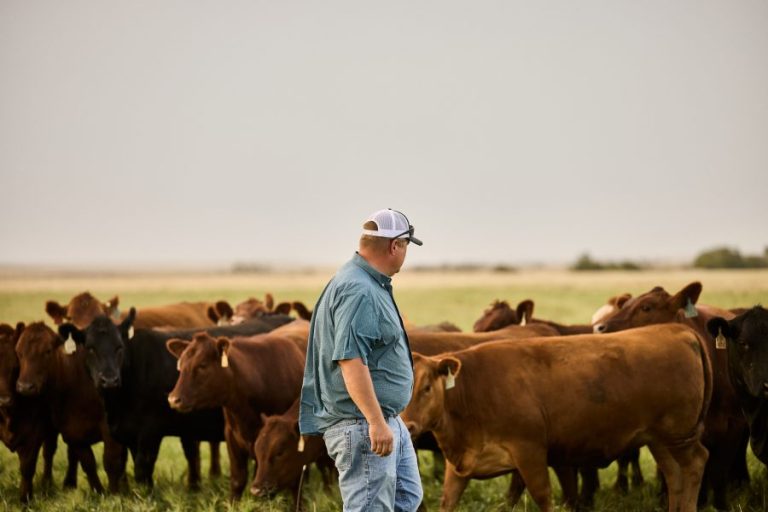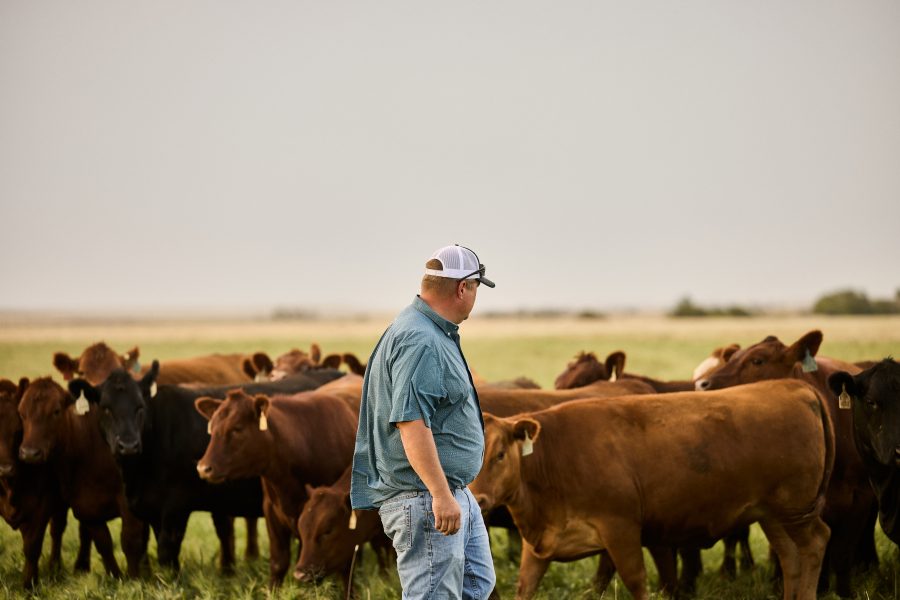LARAMIE, WY – Profits from sales of limited-edition throws made from wool grown and knitted in Wyoming will be reinvested back in the College of Agriculture and Natural Resources sheep and wool program at the University of Wyoming’s Laramie Research and Extension Center (LREC).

Whit Stewart, UW Extension sheep specialist, approached Scott Lake, LREC director, with the idea to create the wool throws. With Lake’s help, the team gained support from the college and dean Barbara Rasco, who has been a huge proponent of the project and the sheep industry efforts as a whole, shared Stewart.
“It ties so many pieces together, and it’s really exciting,” said Rasco. “Each year, I would like to see our group make these blankets and provide a nice memento for our students, our stakeholders, our alumni.”
The project is closely tied with UW’s Center for Blockchain and Digital Innovations and will be one of the first and most visible projects of the chain the university has, said Rasco.
“We want to highlight the land-grant and the history of the University of Wyoming sheep and wool program in a product that truly reflects our mission,” said Stewart. “So, I think the fact that we had a product to tell a really compelling story that would be 100 percent grown and manufactured in the state of Wyoming was probably our motivation and all the while gaining support for the agriculture part of our mission at the land-grant.”
UW has over 130 years of deliberately selected, fine-wool genetics in its sheep flock used for research, teaching and extension purposes.
Two-hundred and seventy-five sheep at LREC underwent their annual haircut in January. The shorn wool was then packaged into 450-pound bales and shipped to Mountain Meadow Wool in Buffalo for processing.
“We use professional shearers to harvest the wool,” said Stewart. “Although we try to have all hands-on-deck for sheep and wool handling, assistant livestock manager Kalli Koepke coordinates the tall task each spring.”
Sheep operations in our region typically shear in spring and send bales to wool warehouses to eventually be shipped to the southeastern U.S. or internationally to be processed, shared Stewart.
Mountain Meadow Wool focuses on smaller scale production and custom processing.
“Raw wool arrives on one end and the finished throw will come out the other end,” said Ben Hostetler, operations manager at Mountain Meadow Wool. “It is pretty unique in the country to be able to do it all in one stop and be a vertically integrated process.”
The raw wool is first washed and all dirt and lanolin, “wool grease,” removed in the scouring line. Once dried, the wool will be carded, which takes the fibers and aligns them into a web of fibers, shared Hostetler.
The web of fiber requires more processing through pin-drafting to make the fibers parallel and create a smoother yarn. After pin-drafting, it moves to spinning, which is where the fibers are pulled apart and added a twist to make a spun yarn, said Hostetler.
“Spinning is the big transformation there to make a product that is usable,” he said.
From this point the yarn is all hand-dyed, dried, put on combs and then passed on to the knitting department, shared Hostetler.
“In knitting we have flat-bed knitting machines and they take that yarn, and we program the pattern in there and it selects the different colors as it goes through and knits a finished throw,” said Hostetler.
After knitting, there are more finishing process, such as labeling and steaming, he said.
“From start to finish, if it was going through all at once, it would take about four weeks from wool to processed throw,” said Hostetler. “That would be the fastest we could get something through the mill.”
This project will be closer to 12 weeks until the finished project is complete, shared Hostetler.
The wool from each sheep can make about 1.5 throws. There will be 300 throws produced and for sale in August, said Stewart.
“It is a very heavy-duty throw,” said Stewart. “It’s thick, it’s heavy, it is able to withstand the elements of Wyoming. We think it really represents Wyoming, not just in the story of its origins and manufacturing, but really in the heft and bulk of the throw.”
The throw was designed by Lindsay Stewart, a fine arts student, using the UW color palette with Steamboat in the middle. Each throw will include a hand-stamped leather label to indicate the design edition and provide a QR code to utilize block-chain technology to see the background behind how the quilt was created, shared Stewart.
Additional blockchain technologies include a non-fungible token (NFT) “chip” will be embedded into the blanket to certify authenticity as a limited-edition collector’s item.
“We want to show agriculture has digital applications and manufacturing innovations that we can really capitalize and make for these projects,” said Stewart.
Stewart plans to partner with Mountain Meadow Wool to help fund two competitive internships for students with proceeds from this project.
“We will send students up to Buffalo for the summer, they will be involved in the processing of this but also be involved in economic feasibility studies related to wool manufacturing and product development,” said Stewart.
Stewart doesn’t see this project ending with wool throws and hopes to have students look into the feasibility of other UW branded wool products.
Student interns will have the opportunity to learn more about textiles and see a different side of the agriculture industry, shared Hostetler.
“It is a testament to the land-grant, the sheep program and the ag college, even though things have changed over time, we are still around, and we are still producing a high-quality product in demand by society,” said Stewart.













